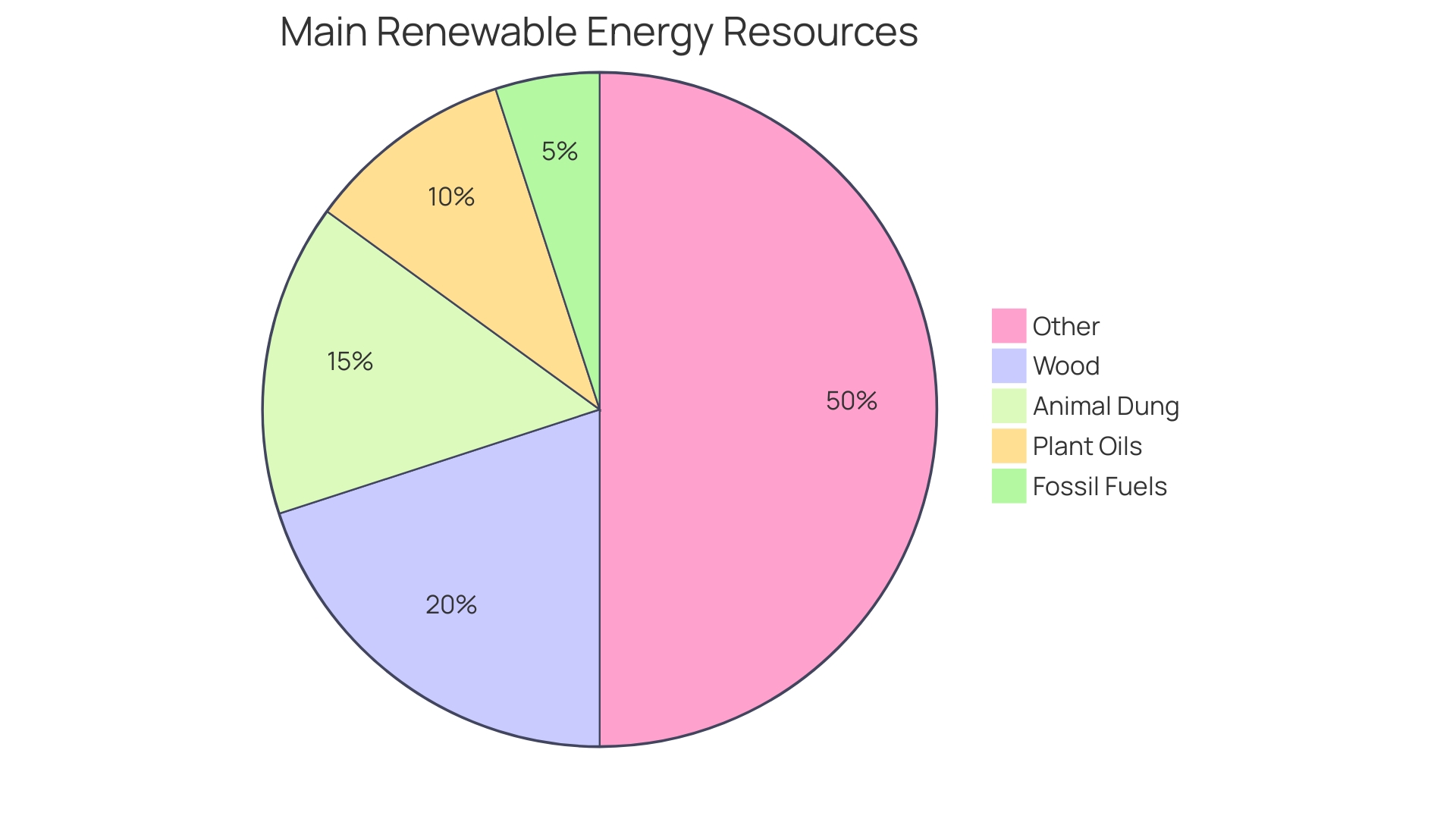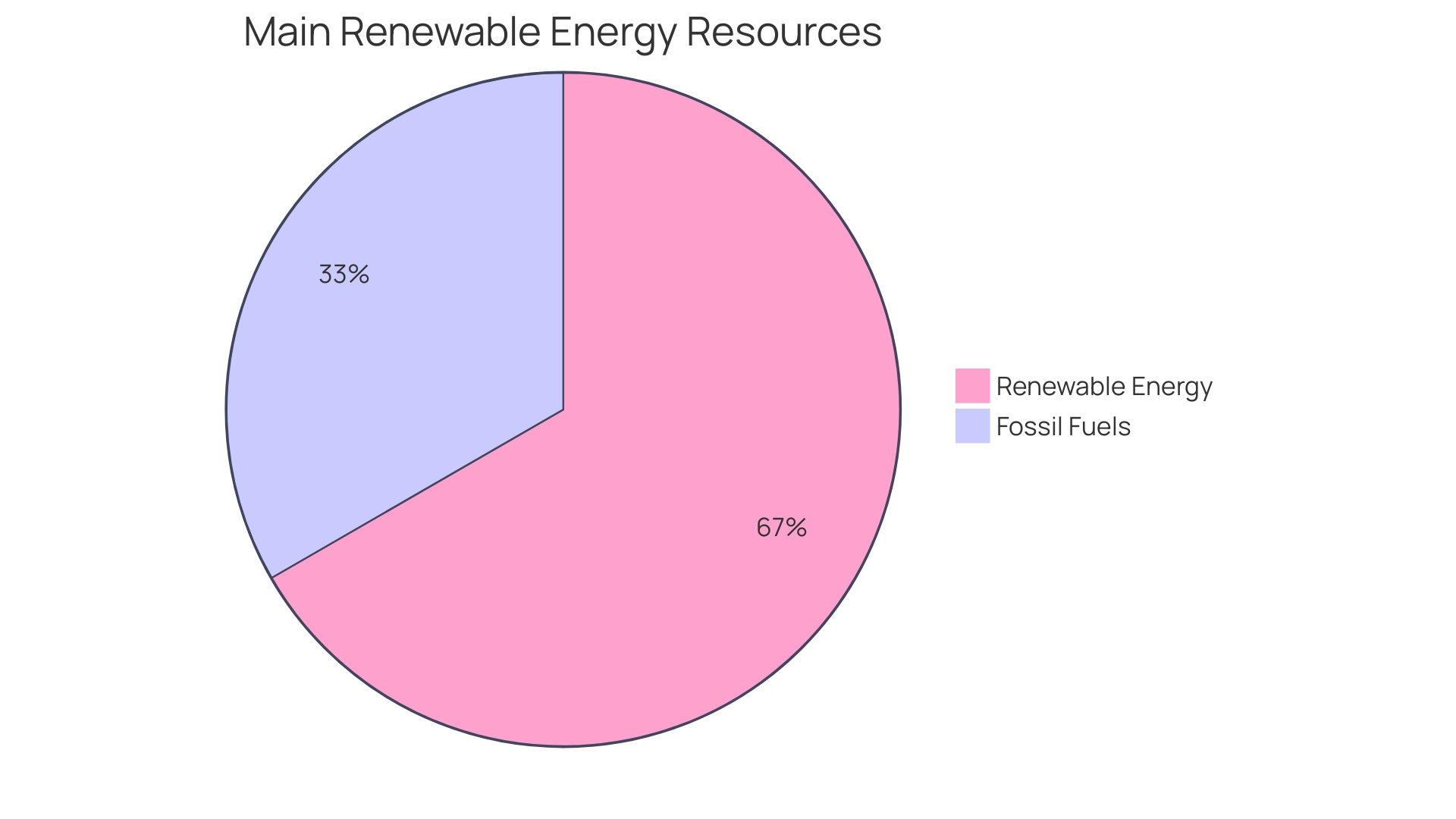Introduction
Renewable fuels, also known as biofuels, are playing a pivotal role in the pursuit of sustainable energy solutions. These fuels, sourced from biological materials like plants, algae, and waste products, offer distinct advantages over finite fossil fuels. One of the most significant benefits of renewable fuels is their ability to reduce greenhouse gas emissions, making them a cornerstone in the fight against climate change.
But their applications go beyond transportation, extending to heating, electricity generation, and even industrial decarbonization. Recent advancements, such as the HyFlexPower project in France, demonstrate how renewable fuels can power turbines using stored green hydrogen during periods of low wind or sunlight. As the renewable fuels sector continues to evolve, major corporations like ENGIE and BP are making ambitious commitments to decarbonize energy-intensive industries.
The broader renewable energy landscape includes wind, solar, hydroelectric, and geothermal sources, each playing a crucial role in transitioning to a greener economy. However, it's important to understand the nuances within the renewable energy lexicon, as terms like 'green,' 'clean,' and 'renewable' have distinct meanings. Despite the challenges, renewable fuels are a testament to human ingenuity and a commitment to a sustainable future.
With each technological breakthrough and policy stride, we move closer to an era where renewable energy becomes the mainstay of our energy supply.
What are Renewable Fuels?
Renewable fuels, commonly referred to as biofuels, stand on the forefront of sustainable energy solutions. These fuels are sourced from biological materials, including plants, algae, and even waste products, distinguishing them from the finite nature of fossil fuels. The most profound advantage of renewable fuels lies in their ability to mitigate greenhouse gas emissions, positioning them as a cornerstone in efforts to reduce our carbon footprint. The versatile application of biofuels extends beyond just transportation to include heating and electricity generation, offering a multifaceted approach to powering our modern world.
Recent advancements in renewable energy technologies have showcased the potential of biofuels in industrial applications. For instance, the HyFlexPower project in France, through the conversion of renewable electricity into green hydrogen, has paved the way for industrial decarbonization. By overcoming material resistance challenges and adapting safety measures for hydrogen's faster and hotter flame, the project has successfully demonstrated the use of stored green hydrogen to power turbines during periods devoid of wind or sunlight.
As the renewable fuels sector continues to evolve, significant milestones have been achieved. Engaging more than 200 professionals, ENGIE has become a beacon in the renewable hydrogen space, aspiring to decarbonize energy-intensive industries and heavy mobility sectors like aviation and maritime transport. Such efforts are instrumental in reaching our climate objectives and have garnered the support of entities like the European Commission.
In the broader context of renewable energy resources, wind, solar, hydroelectric, and geothermal sources have been identified as key players in the transition to a greener economy. Notably, solar and wind power have reached a level of affordability that challenges conventional energy sources in many regions. This cost-competitiveness is crucial for maintaining energy security without the burden of choosing between basic needs and utility bills.
The growing emphasis on renewable energy is reflected in the policies and ambitions of major corporations. For example, BP's commitment to achieving net-zero emissions by 2050 signifies a shift in the energy landscape, with a focus on reducing fossil fuel production. Similarly, the shipping industry, a significant consumer of hydrocarbon fuels, is facing stringent emission regulations, prompting a move towards cleaner energy sources.
Despite the progress, it is essential to understand the nuances within the renewable energy lexicon. Terms like 'green,' 'clean,' and 'renewable' have distinct meanings, often conflated in public discourse. Green energy, for instance, must fulfill the criteria of being renewable and minimize environmental impact throughout its lifecycle. This attention to detail is critical in aligning our energy consumption with our ecological aspirations.
The advancement of renewable fuels is a testament to human ingenuity and a commitment to a sustainable future. With each technological breakthrough and policy stride, we edge closer to an era where renewable energy is not just an alternative, but the mainstay of our energy supply.
Types of Renewable Fuels
The landscape of renewable fuels is diverse, with each type offering unique benefits and requiring distinct production methodologies. Biodiesel, for instance, is made from vegetable oils or animal fats and can seamlessly integrate into existing diesel engines. Bioethanol, another prevalent renewable fuel, is derived from the fermentation of sugars in crops such as corn and sugarcane, and often serves as a gasoline enhancer or a standalone fuel alternative. Biogas, produced via the anaerobic digestion of organic waste, is chiefly methane and finds its use in heating, cooking, and electricity. Hydrogen, though not a fuel per se, is generated through renewable practices like water electrolysis and acts as a clean energy vector for fuel cells and combustion engines.
The push towards renewable energy is evidenced by significant strides in industry and policy. For instance, the recent deployment of the world's first methanol-powered container ship, the Laura Maersk, signals a shift towards greener shipping solutions. Methanol, a biodegradable liquid, allows for a significant reduction in greenhouse gas emissions. Such innovations are in line with Maersk's ambitious goal to achieve net-zero emissions by 2040, underscoring the growing commitment of major industry players to sustainable energy.
Experts with decades of experience in energy and environmental sectors, like Ric with his 40 years in renewable power project development and policy, highlight the transformative potential of renewable energy. The market is ripe with opportunities for investment, particularly in regions like Europe where biodiesel, ethanol, and renewable diesel drive the biofuel market, supported by robust policies and initiatives from the European Union.
Renewable energy resources, including hydropower, wind, solar, and biomass, are integral to the energy mix. Biomass energy, derived from plant and animal matter, has been harnessed for millennia and continues to serve as a versatile source for heating, electricity, and transportation fuels. The agricultural sector contributes significantly with residues from crops such as corn and sugarcane, demonstrating the sector's vital role in the renewable energy landscape.
As we navigate the energy transition, the integration of renewable fuels into our energy systems presents a promising avenue for addressing the pressing challenges of climate change and energy security. The collective expertise of industry veterans and the ongoing advancements in technology and policy are shaping a more sustainable future, powered by renewable energy resources.
Production Methods for Renewable Fuels
Renewable fuels, the linchpins of sustainable energy, are derived from a variety of cutting-edge production methods tailored to each fuel type. For instance, the fermentation process is pivotal for creating bioethanol, where crops or biomass sugars are transformed into alcohol by microorganisms like yeast or bacteria. Meanwhile, biodiesel emerges from transesterification - a chemical reaction of vegetable oils or animal fats with alcohol, typically methanol, and a catalyst, yielding both biodiesel and glycerin as byproducts.
Gasification, a thermochemical conversion of organic matter into synthesis gas, primarily hydrogen and carbon monoxide, sets the stage for manufacturing diverse renewable fuels. The synthesis gas is a versatile intermediate that can be processed further into various forms of clean energy. Additionally, electrolysis presents a technological avenue for hydrogen production by splitting water into its elemental components, hydrogen and oxygen, utilizing an electric current.
The significance of these renewable fuels is underscored by industry experts like Brian, with a profound background in forestry and supply chain management, and Ric, who boasts over four decades in energy and environmental sectors, focusing on renewable power projects. Their expertise converges on the importance of transitioning to renewable energy sources to minimize environmental impact.
Moreover, recent technological advancements, such as those by the Technion Faculty of Materials Science and Engineering, showcase novel methods for green hydrogen production using renewable energy. This innovation, published in Nature Materials, promises to lower costs and expedite the transition to green hydrogen - a cleaner alternative to conventional fossil fuels.
The renewable energy sector's momentum is evident in the significant investments recorded, with data compiled from multiple development financial institutions revealing investments in renewables, expressed in millions of USD. The capacity of renewable power installations, measured in megawatts and generation in gigawatt-hours, demonstrates the tangible growth of sustainable energy infrastructures.
As the industry evolves, it's imperative to address the gender disparity in green energy jobs and foster inclusivity to harness a broader range of talents and perspectives. The drive towards renewable energy is not just a technological transformation but a socio-economic one that calls for diverse participation in shaping a sustainable future.

Why Renewable Fuels Matter
Renewable fuels are pivotal in our march towards a sustainable and low-emission future. They offer several benefits:
-
Lower Carbon Footprint: Renewable fuels, sourced from biological materials, significantly reduce carbon emissions. When combusted, they release considerably less carbon dioxide compared to fossil fuels, which are carbon-intensive and contribute to climate change.
-
Enhanced Energy Security: By incorporating renewable fuels into our energy portfolio, we mitigate reliance on imported fossil fuels. This diversification fortifies national energy security, as seen in Uruguay's near achievement of a 98% green energy-powered grid, predominantly through wind energy.
-
Support for Sustainable Agriculture: The production of biofuels, such as bioethanol, incentivizes sustainable farming methods. It provides a dual benefit of economic growth for farmers and the promotion of environmentally friendly agricultural practices.
-
Employment Opportunities: The burgeoning industry of renewable fuels is a catalyst for job creation across various sectors. From agriculture and manufacturing to R&D, the transition to green energy is fostering new employment avenues.
The global renewable energy scenario is witnessing unprecedented growth. In 2023, the share of renewables in total primary energy consumption climbed to 14.6%, driven by a surge in wind and solar power generation, which saw a 13% rise from the previous year to a record-breaking 4,748 TWh.
Renewable energies like hydrogen fuel cells are gaining traction as sustainable solutions, providing continuous electricity as long as hydrogen and oxygen are supplied. With hydrogen's abundance, its potential is increasingly recognized by companies worldwide.
Despite these advancements, the energy sector faces challenges. The transition to a sustainable energy mix requires a realistic timeline and acknowledgment of the scale of transformation needed for a $100 trillion global economy. Furthermore, gender disparities in green energy jobs highlight the necessity for inclusivity in this growing field.
As the industry evolves, life cycle assessments by institutions like the National Renewable Energy Laboratory (NREL) ensure that renewable technologies are genuinely sustainable. Their analyses help minimize environmental impacts, paving the way for a more equitable and clean energy future.

Benefits of Renewable Fuels
Renewable energy, encompassing green energy solutions like biodiesel, biofuels, and aviation fuel companies in Vermont, has become an increasingly critical part of our energy landscape. One of the most compelling attributes of renewable energy is its sustainability. By harnessing power from organic matter, renewable resources can be continuously replenished, offering a stark contrast to the finite reserves of fossil fuels. These sustainable practices also lead to significant reductions in greenhouse gas emissions, helping to tackle climate change and bolster air quality by mitigating the pollutants released during fuel combustion.
Furthermore, the diversification of energy sources is another benefit. A broad energy mix that includes renewable fuels enables countries to lessen their dependency on fossil fuels, which in turn improves national energy security. Such diversification is vital in today's geopolitical climate where energy supply can be as unpredictable as the prices governing it.
Innovation is at the heart of the renewable energy sector. The continuous development of new technologies is driving forward advancements in feedstock production, conversion processes, and energy storage. These innovations are not just technical achievements; they also represent a shift towards more environmentally friendly and economically viable energy solutions. Pioneers in this field, such as Brian with his extensive background in forestry operations and Rice with his expertise in renewable power projects and policies, exemplify the kind of leadership that is propelling the industry forward.
The renewable energy sector's growth is evidenced by significant developments like BP's commitment to achieving net-zero emissions by 2050, which includes reducing oil and gas production. This goal reflects a broader industry trend where traditional energy companies are pivoting towards sustainable practices. Moreover, advancements such as hydrogen fuel cells, which convert hydrogen and oxygen into electricity, demonstrate the sector's potential for continuous innovation.
It's important to differentiate between terms like 'clean,' 'green,' 'renewable,' and 'sustainable,' as each carries specific implications for environmental impact and resource renewal. For instance, 'green energy' refers to energy sources that are not only renewable but also have minimal environmental trade-offs, while 'clean energy' focuses primarily on the absence of greenhouse gas emissions without necessarily being renewable.
Supporting these points are statistics from authoritative bodies such as the EIA, which categorize five main renewable energy resources, and the IPCC, which provides a common unit for measuring a 'basket' of greenhouse gases. These data sets and frameworks help us understand the tangible benefits of renewable energy, the progress made, and the challenges that lie ahead.
In conclusion, the renewable energy sector is a dynamic and evolving field that offers a multitude of benefits from environmental sustainability to technological innovation. As we continue to witness the expansion and impact of this sector, it's crucial to recognize the efforts of experts and leaders who are guiding this transition towards a more sustainable future.
Challenges of Renewable Fuels
Renewable fuels are gaining traction as a feasible alternative to fossil fuels, yet their implementation is not without its hurdles. A critical concern is the accessibility of feedstock, a situation that varies based on agricultural practices and land availability. Brian's expertise in forestry procurement and supply chain management, as demonstrated at Enviva, showcases the importance of such considerations in the renewable energy sector.
Moreover, the economic feasibility of renewable fuels is often challenged by their production costs. However, as Ric's extensive experience in renewable power projects indicates, strategic policy implementation can propel the growth of these fuels. The declining costs of wind and solar power, from $200 per MWh in 2014 to $127 in 2023, reflect a trend towards more economically viable renewable energy solutions.
The infrastructure for renewable fuel distribution, storage, and dispensing is another area that requires significant investment. Case studies like Uruguay's near-achievement of a 98% green energy-powered grid highlight the transformative potential of such infrastructure development.
Lastly, a supportive policy and regulatory environment are indispensable for fostering the production and adoption of renewable fuels. The progress in green energy policies, as evidenced by President Biden's aim for carbon pollution-free electricity by 2035, alongside green hydrogen's potential when rational subsidies are considered, underscores the crucial role of legislation and subsidies in this domain.
These challenges are surmountable, as demonstrated by the successes and initiatives of industry veterans like Alyssa, who has been at the forefront of energy conservation efforts. The renewable fuels industry is pivoting towards a future where sustainable practices are not only environmentally imperative but also economically competitive.
Applications of Renewable Fuels
Renewable fuels are increasingly becoming vital to our energy matrix, offering sustainable alternatives that cater to a variety of applications:
-
Transportation: Vehicles are steadily shifting gears to greener alternatives with biofuels such as biodiesel and bioethanol. These biofuels serve as renewable substitutes that can either augment traditional fossil fuels or replace them entirely.
-
Residential and Commercial Energy: Buildings and industrial facilities leverage biogas and renewable hydrogen for their heating and cooling needs, tapping into the potential of these versatile energy carriers.
-
Power Generation: In the realm of electricity, biomass and biogas are not just waste; they're resources that can be harnessed through combustion or technological conversions, utilizing gas turbines, steam turbines, or innovative fuel cells to light up our world.
-
Aviation Sector: The skies are also witnessing a transformation with Sustainable Aviation Fuel (SAF). This eco-friendly fuel, derived from renewable sources, is carving a pathway towards a carbon-neutral flight industry.
This multifaceted utility of renewable fuels is echoed in the professional journeys of industry experts like Brian, with his forestry industry acumen and supply chain mastery at Enviva, and Alyssa's decade-long experience in energy conservation projects. Their careers, alongside Tom's 30-year tenure in energy and utilities and Ric's leadership in North American renewable power projects, underscore the dynamic and impactful roles that renewable fuels play across diverse sectors.
The growth and application of these fuels are further underlined by the European biofuel market's rapid expansion, where ethanol, biodiesel, and renewable diesel are spearheading the transition, as indicated by the robust policies and initiatives of the European Union. As we navigate through an evolving energy landscape, the integral contributions of renewable fuels to our energy security and sustainability cannot be overstated.
Future Developments in Renewable Fuels
The renewable fuels sector is at the cusp of transformative growth, propelled by groundbreaking research and innovation. We're seeing a surge in the exploration of advanced feedstocks, such as algae and non-food crops, which are paving the way for a more sustainable and abundant production of renewable fuels. These sources offer a promising horizon for the industry, potentially reducing reliance on traditional feedstocks and minimizing the environmental footprint of fuel production.
In the realm of conversion processes, there's a significant push towards refining thermochemical and biochemical methods. The objective is to heighten efficiency while concurrently driving down production costs, thereby making renewable fuels more competitive in the energy market. Pioneering work, such as the utilization of CO2 in the laboratory to produce fuels and other valuable materials, showcases the industry's commitment to innovation and sustainability.
The integration of renewable fuels into existing energy grids hinges on the development of robust energy storage solutions. These advancements are essential to ensure a consistent and reliable energy supply, accommodating the ebb and flow of energy production from renewable sources.
To bolster these developments, policy support remains a linchpin. Incentives and supportive regulations are critical for attracting investments and fostering continued progress in the renewable fuels landscape. Europe, in particular, has been proactive in this regard, with the biofuel market flourishing under the guidance of various policies and initiatives designed to promote the use of ethanol, biodiesel, and renewable diesel.
As the renewable fuels industry forges ahead, companies like Yokogawa are instrumental in optimizing production and supply chains through digital technologies, thereby facilitating the transition to more autonomous operations. This strategic application of digitalization is a testament to the industry's adaptability and forward-thinking approach to addressing energy challenges.
Furthermore, industry veterans with decades of experience, such as Ric, who has led the development of over 8GW of renewable power projects, and Brian, with expertise in procurement and supply chain operations, exemplify the caliber of leadership propelling the industry forward. Their insights into renewable energy policy and operational excellence are invaluable as the sector navigates the complexities of growth and integration into the broader energy ecosystem.
In conclusion, the renewable fuels industry is poised for an exciting future. With advanced feedstocks, innovative conversion processes, pivotal energy storage solutions, and unwavering policy support, the industry is well-equipped to meet the growing demand for sustainable and efficient energy solutions.

Regulatory Frameworks and Standards
Renewable fuels are increasingly becoming a pivotal element of the global energy transition, guided by a complex array of regulations, certifications, and economic mechanisms. The Renewable Fuel Standards (RFS) are government-mandated policies requiring a certain volume of renewable fuels, such as biodiesel or ethanol, to be blended with traditional fossil fuels. This initiative aims to reduce greenhouse gas emissions and encourage the use of cleaner energy sources in transportation.
Sustainability certifications play a critical role in ensuring that the production and consumption of renewable fuels adhere to environmental and social standards. These certifications assess various factors, including the reduction of greenhouse gas emissions and the conservation of natural ecosystems, to guarantee that renewable fuels contribute positively to sustainability goals.
On the international stage, agreements like the Paris Agreement serve as beacons for collective action against climate change. Such agreements are instrumental in galvanizing support for renewable fuels, underscoring their importance in curbing global warming and reducing the world's dependency on fossil fuels.
Financial incentives and subsidies offered by governments underscore the economic drive towards renewable fuels. Tax credits, grants, and other financial mechanisms are designed to support the renewable fuel industry, aid in the research and development of new technologies, and make renewable energy solutions more competitive in the market.
These regulatory frameworks and economic policies are reflective of a broader commitment to fostering a sustainable energy future, mirrored in the substantial investments made through acts like the Infrastructure Investment and Jobs Act (IIJA) of 2021 and the Inflation Reduction Act (IRA) of 2022. These initiatives underscore the importance of renewable fuels in the energy landscape and reinforce the commitment to a greener, more resilient energy sector.
Case Studies and Examples
Vermont has established itself as a pioneer in the renewable energy sector, with initiatives like the Vermont Bioenergy Initiative leading the charge in research and development of bioenergy systems. This commitment is also evident in the work of Green Mountain Power, which has instituted forward-thinking programs to promote the use of renewable sources for electricity generation.
The aviation industry, too, is making strides toward sustainability with the adoption of sustainable aviation fuel (SAF). A historic flight by Virgin Atlantic, powered solely by alternative fuels, marks a significant step in the journey toward greener flying, despite challenges in fuel supply and the need for further technological advancements to meet emissions targets.
Hydrogen, a carbon-free and abundant element, is touted for its potential to revolutionize the energy landscape. With fewer emissions than natural gas and compatibility with existing infrastructure, hydrogen is poised to play a crucial role in reducing carbon emissions in sectors like transportation and agriculture, thus supporting clean energy objectives.
The renewable energy sector is not only about environmental benefits but also brings economic and social advantages, such as job creation in the green energy sector. Exciting innovations like energy-generating paint and bio-solar panels are on the horizon, promising to enhance the sustainability and impact of renewable energy.
While Vermont continues to innovate and lead, experts with decades of experience in energy and environmental sectors, like Ric with his pioneering work in renewable power projects and hydrogen development, provide valuable insights into the future of renewable energies. These professionals, along with substantial investments in the sector, underscore the growing capacity and generation capabilities of renewable energy sources, showcasing a transformative shift toward a more resilient and sustainable energy ecosystem.

Conclusion
Renewable fuels, sourced from biological materials, offer distinct advantages over finite fossil fuels by reducing greenhouse gas emissions. They have versatile applications beyond transportation and are being utilized in heating, electricity generation, and industrial decarbonization. Recent advancements, such as the HyFlexPower project in France, demonstrate the potential of renewable fuels to power turbines using stored green hydrogen.
Major corporations like ENGIE and BP are committed to decarbonizing energy-intensive industries, driving the evolution of the renewable fuels sector.
In the broader renewable energy landscape, including wind, solar, hydroelectric, and geothermal sources, each plays a crucial role in transitioning to a greener economy. Understanding the nuances within the renewable energy lexicon is important, as terms like 'green,' 'clean,' and 'renewable' have distinct meanings.
Renewable fuels are a testament to human ingenuity and our commitment to a sustainable future. With each technological breakthrough and policy stride, we move closer to an era where renewable energy becomes the mainstay of our energy supply. The renewable fuels industry, catering to an audience with a deep understanding of the sector, thrives on technical insights and analysis.
The expertise of industry veterans and ongoing advancements in technology and policy shape a more sustainable future, powered by renewable energy resources. As we witness the expansion and impact of this sector, it's crucial to recognize the efforts of experts and leaders guiding the transition towards a sustainable future.




